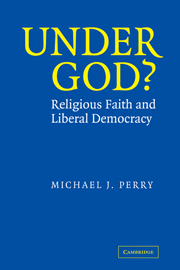Book contents
- Frontmatter
- Contents
- Introduction: The Controversy over Religion in Politics
- I Mainly for the Agnostics and the Exclusionists
- 1 What Does the Establishment Clause Forbid? Reflections on the Constitutionality of School Vouchers
- 2 Why Political Reliance on Religiously Grounded Morality Does Not Violate the Establishment Clause
- 3 Why Political Reliance on Religiously Grounded Morality Is Not Illegitimate in a Liberal Democracy
- II Mainly for the Agnostics and the Inclusionists, Especially Inclusionists Who Are Religious Believers
- Conclusion: “This Nation, Under God”
- Notes
- Index
1 - What Does the Establishment Clause Forbid? Reflections on the Constitutionality of School Vouchers
Published online by Cambridge University Press: 05 June 2012
- Frontmatter
- Contents
- Introduction: The Controversy over Religion in Politics
- I Mainly for the Agnostics and the Exclusionists
- 1 What Does the Establishment Clause Forbid? Reflections on the Constitutionality of School Vouchers
- 2 Why Political Reliance on Religiously Grounded Morality Does Not Violate the Establishment Clause
- 3 Why Political Reliance on Religiously Grounded Morality Is Not Illegitimate in a Liberal Democracy
- II Mainly for the Agnostics and the Inclusionists, Especially Inclusionists Who Are Religious Believers
- Conclusion: “This Nation, Under God”
- Notes
- Index
Summary
INTRODUCTION
[This chapter was completed before the Supreme Court, on June 27, 2002, decided the Cleveland school voucher case: Zelman v. Simmons-Harris. The Court ruled, by a vote of five to four, that the Cleveland school voucher program does not violate the Establishment Clause of the United States Constitution. As one can infer from my argument in this chapter, I think that the Court's ruling was correct.]
Both during his campaign for the presidency of the United States and after moving into the White House, George Bush made two proposals that fanned the flames of the ongoing controversy over the proper role of religion in the nation's public life. Expressing alarm at the persistently sorry state of many of the nation's public elementary and secondary schools, Bush proposed a program of school vouchers in which even religiously affiliated schools would be eligible to participate. More famously, he proposed making it easier for “faith-based” social service providers to gain access to federal financial support. In response to Bush's (and similar) proposals, many have insisted, and many others have denied, that government aid to religiously affiliated entities, such as elementary and secondary schools and social service providers, would violate the constitutionally mandated separation of church and state. In this chapter, I inquire whether the constitutional imperative that government not “establish” religion leaves any room for government to spend money in support of religiously affiliated schools.
- Type
- Chapter
- Information
- Under God?Religious Faith and Liberal Democracy, pp. 3 - 19Publisher: Cambridge University PressPrint publication year: 2003



